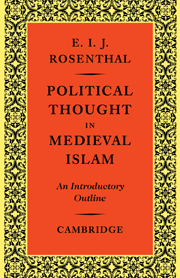Book contents
- Frontmatter
- Contents
- AUTHOR'S NOTE
- ABBREVIATIONS
- INTRODUCTION
- PART I CONSTITUTIONAL LAW AND MUSLIM HISTORY
- I THE QUEST FOR HAPPINESS
- II THE CALIPHATE: THEORY AND FUNCTION
- III GOVERNMENT
- IV THE THEORY OF THE POWER-STATE: IBN KHALDŪN'S STUDY OF CIVILIZATION
- PART II THE PLATONIC LEGACY
- APPENDIX: SOME TURKISH VIEWS ON POLITICS
- NOTES
- GLOSSARY
- INDEX
IV - THE THEORY OF THE POWER-STATE: IBN KHALDŪN'S STUDY OF CIVILIZATION
Published online by Cambridge University Press: 07 May 2010
- Frontmatter
- Contents
- AUTHOR'S NOTE
- ABBREVIATIONS
- INTRODUCTION
- PART I CONSTITUTIONAL LAW AND MUSLIM HISTORY
- I THE QUEST FOR HAPPINESS
- II THE CALIPHATE: THEORY AND FUNCTION
- III GOVERNMENT
- IV THE THEORY OF THE POWER-STATE: IBN KHALDŪN'S STUDY OF CIVILIZATION
- PART II THE PLATONIC LEGACY
- APPENDIX: SOME TURKISH VIEWS ON POLITICS
- NOTES
- GLOSSARY
- INDEX
Summary
In a world in which everything is related to God and his plan we can hardly expect an independent political theory. Yet a North African Muslim of the fourteenth century, Ibn Khaldūn (1332–1406), did in fact propound a theory of the power-state which transcends the opinions generally held in the Middle Ages. Not only is the state an end in itself with a life of its own, governed by the law of causality, a natural and necessary human institution; it is also the political and social unit which alone makes human civilization possible. It is this human civilization which is the object of his inquiry and the subject of his “new science of history”. In the Muqaddima, (Introduction) to his Universal History (kitānal-ʿibar) he composed a Summa, not of theology but of civilization, founded on that Islamic civilization with all of whose aspects he was thoroughly familiar. His political theory is part of his description of ʿumrān, in the specific sense of “civilization”. The close connection between civilization and politics as the art of government is apparent from Ibn Khaldūn's terminology; for ʿumrān is synonymous with madanīya and ḥadāra, settled urban life (as distinct from badāwa, rural life). Ḥadāra in turn is equivalent to tamaddun, to live or become organized in a city (madīna) in the sense of the Greek polis.
Ibn Khaldūn's empiricism, manifest in his “new science”, is matched by his traditionalism.
- Type
- Chapter
- Information
- Political Thought in Medieval IslamAn Introductory Outline, pp. 84 - 110Publisher: Cambridge University PressPrint publication year: 1958
- 1
- Cited by



